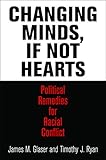Changing Minds, If Not Hearts : Political Remedies for Racial Conflict / Timothy J. Ryan, James M. Glaser.
Material type: TextSeries: American Governance: Politics, Policy, and Public LawPublisher: Philadelphia : University of Pennsylvania Press, [2013]Copyright date: ©2013Description: 1 online resource (192 p.) : 10 illusContent type:
TextSeries: American Governance: Politics, Policy, and Public LawPublisher: Philadelphia : University of Pennsylvania Press, [2013]Copyright date: ©2013Description: 1 online resource (192 p.) : 10 illusContent type: - 9780812245288
- 9780812208467
- African Americans -- Political activity -- 21st century
- African Americans -- Politics and government -- 21st century
- Group identity -- Political aspects -- United States -- 21st century
- Race -- Political aspects -- United States -- 21st century
- Public Policy
- POLITICAL SCIENCE / Political Process / General
- Political Science
- Public Policy
- 323.1196/0730905 23
- online - DeGruyter
- Issued also in print.
| Item type | Current library | Call number | URL | Status | Notes | Barcode | |
|---|---|---|---|---|---|---|---|
 eBook
eBook
|
Biblioteca "Angelicum" Pont. Univ. S.Tommaso d'Aquino Nuvola online | online - DeGruyter (Browse shelf(Opens below)) | Online access | Not for loan (Accesso limitato) | Accesso per gli utenti autorizzati / Access for authorized users | (dgr)9780812208467 |
Frontmatter -- CONTENTS -- Chapter 1. burdens of our past -- Chapter 2. ballot architecture and the building of schools -- Chapter 3. following neighbors, if not leaders -- Chapter 4. remorse, retribution, and restoration -- Chapter 5. a panoply of preferences -- Chapter 6. a spotlight on race neutrality -- Chapter 7. changing minds, if not hearts -- Notes -- References -- Index -- Acknowledgments
restricted access online access with authorization star
http://purl.org/coar/access_right/c_16ec
Americans preach egalitarianism, but democracy makes it hard for minorities to win. Changing Minds, If Not Hearts explores political strategies that counteract the impulse of racial majorities to think about racial issues as a zero-sum game, in which a win for one group means a loss for another. James M. Glaser and Timothy J. Ryan argue that, although political processes often inflame racial tensions, the tools of politics also can alleviate conflict.Through randomized experiments conducted in South Carolina, California, Michigan, Mississippi, Oklahoma, and New Jersey, Glaser and Ryan uncover the racial underpinnings of disputes over affirmative action, public school funding initiatives, Confederate flag displays on government buildings, reparations, and racial profiling. The authors examine whether communities rife with conflict endorse different outcomes when issues are cast in different terms-for example, by calling attention to double standards, evoking alternate conceptions of fairness and justice, or restructuring electoral choices to offer voters greater control. Their studies identify a host of tools that can help overcome opposition to minority interests that are due to racial hostility. Even in communities averse to accommodation, even where antipathy and prejudice linger, minorities can win.With clearly presented data and compelling prose, Changing Minds, If Not Hearts provides a vivid and practical illustration of how academic theory can help resolve conflicts on the ground.
Issued also in print.
Mode of access: Internet via World Wide Web.
In English.
Description based on online resource; title from PDF title page (publisher's Web site, viewed 24. Apr 2022)


